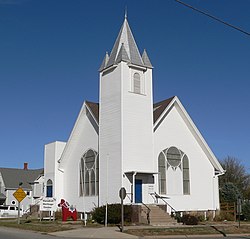 | |
 | |
| Established | 1989 |
|---|---|
| Location | 301 N. Charde Oakland, Nebraska |
| Coordinates | 41°50′09″N96°27′47″W / 41.83589°N 96.46313°W |
The Swedish Heritage Center is a museum of Swedish memorabilia located at 301 N. Charde in Oakland, Nebraska. The museum displays artifacts brought by Swedish pioneers, including Swedish crystal, linens, and needlework. [1]